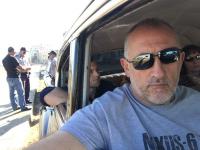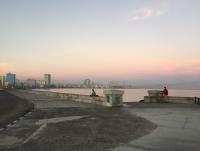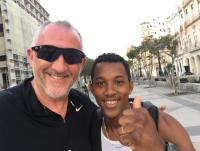25-01-2017, 01:32 AM,
(This post was last modified: 25-01-2017, 04:08 PM by Sweder.)
|
|
|
Sweder

Twittenista
    
|
Posts: 6,577
Threads: 420
Joined: Nov 2004
|
|
RE: January 2017
Cuba.
It was the kids that put Castro's archipelago on our radar. Get to Cuba before it really opens up, they said. As it turns out, Cuba 'opened up' some while ago. At least, Old Havana did. It's now something of a theme park, so long as you stay on the well-beaten tourist track. Classic American cars, canny street performers, churro vendors, kiss-me-quick ladies hustling photo-ops, images of Fidel and Chez emblazened across a catalogue of cheesy merchandise.
Havana being our sole Cuban target this trip, we shoe-horned a three-day city break into the middle of a two-week Caribbean holiday. I was obliged to miss the first four days, thanks to a pressing business matter. I arrived in the region the night before we left for Havana, barely time to get some sand between my toes in a pre-dawn oceanside plod.
Beyond the tourist-centric facade, Havana did not disappoint. A patchwork of architecture and culture, buildings ranging from near collapse to fully renovated. Art Deco giants rub rounded shoulders with mildewed, lofty appartments, crumbling edifices leaning on shining modern fascias of glass and steel.
We opted to stay in a private house. Tales of over-priced, under-whelming hotels reached us just in time. We signed up with Cuba Direct for a three-room apartment in the Calle Habana, a narrow, dusty avenue set a stone's throw from the old fort and entrance to the labyrinth of Old Town. Our slightly precarious balcony overlooked a well-worn courtyard, housing a busy five-a-side football pitch. Ireana, our gracious hostess, greeted us warmly on arrival, offering advice and helpful dining suggestions.
Another rumour we'd picked up on was of bland food. This seemed odd. Cuba lies in the heart of the Caribbean, a hot-bed of spice and flavour. Perhaps this lack of pep is government-driven, as the best food in our experience was to be found away from the big, state-run restaurants, in the Paladares, small private bistros restricted (by law) to 50 seats or less, just as our hostess had advised.
Our first night saw us boarding a Purple 1950's Chevy Impala, headed for the Hotel Nacional, the iconic colonial building sat on the hill towards the western end of the Malecon, Havana's ocean-front highway. Black tie waiters, long tables and silver silvers are de rigueur. Glittering chandeliers flew overhead, slung from thick oak beams forty feet above us as we chowed down on Ropa Vieija, paradoxically a peasant dish of shredded beef served with rice and beans.
We dined in the Aguilar room, named after the first hero of Cuba, a man who successfully saw off the British invaders and built the Castillo de San Salvador de la Punta, the impressive sea fort guarding the entrance to the old Habana Port. This place had hosted any number of luminaries, as the illustrated menu showed. Winston Churchill, after whom the walk-in wine closet appeared to be named, Al Capone, over in the late 1920's/ early '30's, to oversee rum-running arrangements, plus a variety of stars of stage and screen.
The big disappointment for me was the plantain, or fried banana, a Caribbean speciality. This hadn't simply been baked, it had surely been buried in the depths of the hot, dry earth for weeks before being hung out in the midday sun. Without a hint of original flavour or an ounce of moisture, it was harder to swallow than a White House press statement. Something that did not fall short of our high expectations was the coffee. Cuban coffee is like crack cocaine. Chug a cup and you'll feel your heart start as if zapped with jumper cables.
Thursday morning arrived, as did Ireana, to lay out a delicious spread of watermelon, papaya, toast, scrambled eggs and sweet, fresh beef tomatoes, washed down with iced guava and more essential cafe Cubano. At 9am sharp Guillermo arrived. Handsome, tanned with short, salt n pepper hair, here was our guide for a pre-booked city tour. Moments later our tour bus appeared. A gorgeous black and white 1953 Chevrolet, all toothy chrome grill, white-walled tyres, bench seats and muscular haunches. Sadly I wouldn't get to drive this classic; Guillermo had someone to take care of that, a silent giant of a man, hunched over the wide, manually operated steering wheel, a well-chewed cigar-stump clenched in a permanent grin.
 No sooner had we climbed aboard and set off along the Malecon, sirens wailed and we were pulled over. The driver rolled his eyes as Guillermo muttered 'time-wasters'. Goliath eased himself from the front bench, clutching a wad of crumpled papers.
'They always travel in twos' explained our guide.
'High school diplomas require 12 years of study. Police must travel in pairs because each has only six.'
No sooner had we climbed aboard and set off along the Malecon, sirens wailed and we were pulled over. The driver rolled his eyes as Guillermo muttered 'time-wasters'. Goliath eased himself from the front bench, clutching a wad of crumpled papers.
'They always travel in twos' explained our guide.
'High school diplomas require 12 years of study. Police must travel in pairs because each has only six.'
In Paris they say 'one can read, the other can write'.
 After a good five minutes of checking and chatting, we set off once more. Around the hotels and casinos, into the leafy lanes of Miramar, adourned with great houses, once occupied by gangsters and rich American businessmen.
After a good five minutes of checking and chatting, we set off once more. Around the hotels and casinos, into the leafy lanes of Miramar, adourned with great houses, once occupied by gangsters and rich American businessmen.
'After the revolution they fled to the USA to wait for Castro to fall. Those still living are waiting still.'
Under Castro the houses fell into the hands of gardeners and house keepers, some of whom, and their families, live there now.
On to the Colombus Cemetary, home to a bewildering array of grandiose monuments honed from the finest Italian marble, proof that, whilst you can't take it with you, you can try to spend it on the way out. The tallest of the mausoleums is that dedicated to 20 Cuban firemen. On 17th May, 1890, these brave souls were lost at a fire at the Havana armoury when a basement full of explosives went up. To this day, no structure in the cemetary is permitted to stand taller. One former president, perhaps a relative of the incumbent POTUS, had the entrance to his own family tomb built to half-height, so that all who enter should bow good and low on the way in.
We took the highway out of town, heading east towards Cojima, the fishing village where Hemingway sat and, over any number of daiquiris, shot the breeze with sun-dried, deep-sea fishermen, whittling and polishing the stories that became the Old Man And The Sea. Tributes to the man, and his skipper, Raúl Corrales, abound; busts, portraits, a roped off table and seats in his chosen spot. We supped his signature Blue Daquiri before returning to Havana, where the tour was to continue on foot.
Friday morning brought clear skies, perfect for an early city run. I set off past the deserted football pitch for the Malecon, where keen fishermen and occasional sea-gazers peppered the seawall. Central Havana rose from the morning haze as I shuffled past the early cruisers; Dodge, Buick, Chevrolet, not simply well-kept classics but functional taxis, filling the air with thick black smoke.
 I cut inland at the hotel Deuxville, the Avenida de Italia carrying me up and away from the ocean, into the crumbling heart of the city. I overtook a tricycle taxi, making eye contact with the weary peddler. I passed the Casa de la Musica, 50's-style American Concert Hall, where later that night we would line up with the locals to enjoy a night of hot Salsa music and wild dancing. Ahead sat the Capitolo Nacional, functional scale replica of Washington DC's Capitol building. The mighty dome sat pinned by scaffold poles, undergoing a monumental facelift.
The Capitolo sits on the edge of Central Parque, atop the Prado, Havana's Ramblas. Behind me sat the delapedated Central disctrict; ahead lay it's favoured kin, Old Habana, buildings shiny, restored, undergoing or awaiting restoration. I skirted the Capitol, ducking down San Marti onto Obrspia, into the heart of Old Town. Left onto Aguate, Avenida de la Misiones, Refugio and past the Museo de la Revolucion, a solitary tank standing out front in solemn salute.
A drop of the left shoulder and I hit Paseo de Marti and the Prado proper. Like La Rambla in Ameria, the Prado has a pedestranised centre, lined with manicured trees, wooden benches, populated by locals heading to work or class. School kids chirped and chattered, attended by noisy, darting birds dipping in and out of the trees. Sunlight filtered through the gently dancing branches, casting dappled shadows across the pavement.
I turned left/ uphill, back towards the Capitol, turning at the top to start the long run home. I was met there by a young local lad, tanned, lithe, kitted out in vest and shorts. As I appraoched his eyes widened over a broad smile.
'Hola! You are running; may I join you?'
'Of course. I'm almost finished though'
Smiles and gestures confirmed our clumsy exchange.
I cut inland at the hotel Deuxville, the Avenida de Italia carrying me up and away from the ocean, into the crumbling heart of the city. I overtook a tricycle taxi, making eye contact with the weary peddler. I passed the Casa de la Musica, 50's-style American Concert Hall, where later that night we would line up with the locals to enjoy a night of hot Salsa music and wild dancing. Ahead sat the Capitolo Nacional, functional scale replica of Washington DC's Capitol building. The mighty dome sat pinned by scaffold poles, undergoing a monumental facelift.
The Capitolo sits on the edge of Central Parque, atop the Prado, Havana's Ramblas. Behind me sat the delapedated Central disctrict; ahead lay it's favoured kin, Old Habana, buildings shiny, restored, undergoing or awaiting restoration. I skirted the Capitol, ducking down San Marti onto Obrspia, into the heart of Old Town. Left onto Aguate, Avenida de la Misiones, Refugio and past the Museo de la Revolucion, a solitary tank standing out front in solemn salute.
A drop of the left shoulder and I hit Paseo de Marti and the Prado proper. Like La Rambla in Ameria, the Prado has a pedestranised centre, lined with manicured trees, wooden benches, populated by locals heading to work or class. School kids chirped and chattered, attended by noisy, darting birds dipping in and out of the trees. Sunlight filtered through the gently dancing branches, casting dappled shadows across the pavement.
I turned left/ uphill, back towards the Capitol, turning at the top to start the long run home. I was met there by a young local lad, tanned, lithe, kitted out in vest and shorts. As I appraoched his eyes widened over a broad smile.
'Hola! You are running; may I join you?'
'Of course. I'm almost finished though'
Smiles and gestures confirmed our clumsy exchange.
 We set off, side by side. His name was Andres, a local in training for the Havana half marathon, scheduled for Sunday, the day after we leave town. I winced, thought a good part of me was happy I'd missed this. I'm hardly race-ready. I asked him how his training was going.
'OK, I hope to run 1 hour 10 or there abouts. But I need some new shoes.'
He glanced down at my well-worn Adidas Boosts.
'They look good'.
We set off, side by side. His name was Andres, a local in training for the Havana half marathon, scheduled for Sunday, the day after we leave town. I winced, thought a good part of me was happy I'd missed this. I'm hardly race-ready. I asked him how his training was going.
'OK, I hope to run 1 hour 10 or there abouts. But I need some new shoes.'
He glanced down at my well-worn Adidas Boosts.
'They look good'.
I was about to say how many miles they'd done, point out that my feet were at least three sizes larger, when I noticed he was wearing odd shoes. Not odd as in unusual, but two different brands. They were dusty, the souls thin and worn. I felt both moved to help and helpless. We'd exhausted our ability to converse in broken English/ butchered Spanish, so I simply smiled.
He grinned at me before upping his pace, forcing me to work hard to keep up. We reached the end of the Paseo, weaving through some public gardens before easing up into 'my' street. We shook hands and wished each other good luck in our races.
For all the mystery and magic of travel, nothing warms the heart like the people we meet.
The harder the conflict, the more glorious the triumph
|
|
|
|




